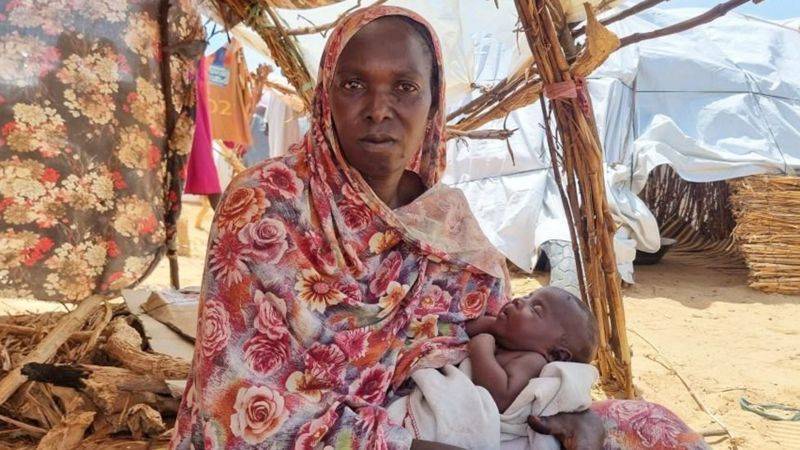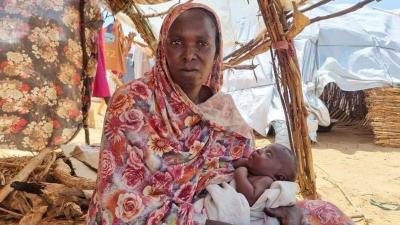Sudanese presenter Arafa Adom has experienced the horrors of war firsthand, witnessing the murder of her three children and the mutilation of other family members. She fled on foot from Sudan's Darfur region while pregnant and gave birth to an infant at the border crossing with Chad. She recounted her experience during the bloody months that followed the war's outbreak on April 15: "I gave birth on the road. There were no midwives or anyone to support me. Everyone was thinking of themselves. Everyone was running to save their own lives."
She was met by a reporter in a refugee camp housing tens of thousands in the outskirts of a Chadian city: "The baby came out, and I wrapped him. I didn't think of anything else. I kept walking to the city of Adré." The 38-year-old presenter shared that she walked under the scorching sun for 25 kilometers from her hometown of Geneina with her four daughters, while her husband took a longer and more difficult route to reach the camp for his safety. Adom said, “When I reached the border, I found myself exhausted and worn out until I gave birth to my child.”
She mentioned that she also left behind the bodies of her three sons, aged between three and nine, explaining that they were killed by militias. In the same camp, Sheikh Mohammed Yaqub, an influential Muslim cleric and leader of the Massalit tribe, recounted what happened to them: “We tried to defend ourselves, but they were using very heavy weapons.” He added, “In our area, we lost 82 people within three hours.”
Adom recounted that her sons were killed at Geneina University, where they had sought refuge before it was bombed by the Rapid Support Forces (RSF) and Janjaweed, setting it on fire. She stated, "My three sons were hit by shells and lost their lives in the same place.” She indicated that many extended family members were also killed, including her father-in-law, whose legs were "shattered," had one of his ears cut off, and was then shot dead.
Afterward, Adom and her husband fled with their daughters, taking back roads to avoid checkpoints manned by RSF members, who reportedly killed Massalit men and boys, sometimes by dousing them in gasoline and setting them on fire. The couple reunited in a refugee camp, where her husband embraced their newborn, named Mohammed, for the first time, seeing him as a blessing after losing their three sons.
The reporter noted that Sheikh's wife, Rukhia Adom Abd al-Karim, also shared that she was pregnant but lost her child the day after they arrived in Adré, a grueling journey that left her hungry, exhausted, and weak. She said, "I started bleeding, then I got a headache, and the bleeding continued. Then the baby was born at dawn." The hospital was overcrowded with patients, mostly women, infants, and children, some with gunshot wounds.
Naima Ali, one of the patients, mentioned she and her nine-month-old son were shot by an RSF sniper while fleeing their village. The boy was on her back when a bullet struck his leg, and "I was hit in my side and lost my kidney." She said, "We were bleeding and no one helped us," noting that she too continued to flee on foot until she reached the camp.
Sheikh Yaqub stated, "What is happening is worse than what happened in 2003," pointing out that many prominent Massalit figures, including doctors and lawyers, have been killed. Adom, who used to host programs on the now-defunct Geneina radio station, was fortunate to survive when RSF forces stormed the radio office in the early days of the war. She said, "They entered and smashed all the equipment and stole what they could."
Now, Adom lives in a hut made of sticks and pieces of cloth, uncertain if she will ever be able to return home. Holding her three-week-old baby in her arms, she said, "We came as refugees. Many died along the way. But we had to keep moving." Another refugee dismissed the idea of returning, saying, "Who should I return to? I've been here for weeks, and the smell of decaying bodies in the streets of Geneina still lingers in my nose."




